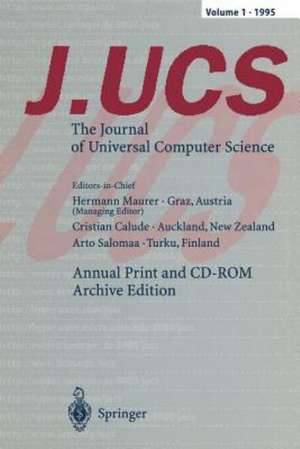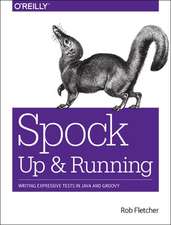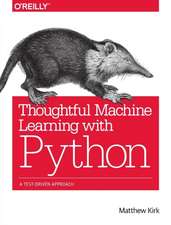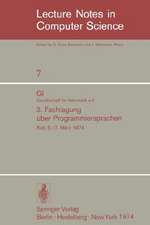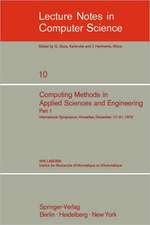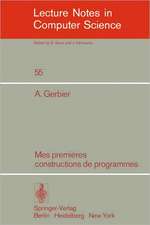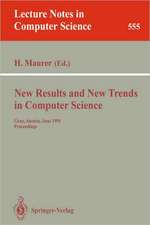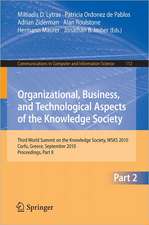J.UCS The Journal of Universal Computer Science: Annual Print and CD-ROM Archive Edition Volume 1 • 1995
Editat de Hermann Maurer, Christian Calude, Arto Salomaaen Limba Engleză Paperback – 15 dec 2011
J.UCS is based on HyperWave (formerly Hyper-G), a networked hypermedia information system compatible with other systems.
Preț: 360.76 lei
Preț vechi: 450.94 lei
-20% Nou
Puncte Express: 541
Preț estimativ în valută:
69.04€ • 74.97$ • 57.99£
69.04€ • 74.97$ • 57.99£
Carte tipărită la comandă
Livrare economică 22 aprilie-06 mai
Preluare comenzi: 021 569.72.76
Specificații
ISBN-13: 9783642803529
ISBN-10: 3642803520
Pagini: 872
Ilustrații: XXXVI, 832 p.
Dimensiuni: 155 x 235 x 46 mm
Greutate: 1.2 kg
Ediția:Softcover reprint of the original 1st ed. 1996
Editura: Springer Berlin, Heidelberg
Colecția Springer
Locul publicării:Berlin, Heidelberg, Germany
ISBN-10: 3642803520
Pagini: 872
Ilustrații: XXXVI, 832 p.
Dimensiuni: 155 x 235 x 46 mm
Greutate: 1.2 kg
Ediția:Softcover reprint of the original 1st ed. 1996
Editura: Springer Berlin, Heidelberg
Colecția Springer
Locul publicării:Berlin, Heidelberg, Germany
Public țintă
ResearchCuprins
Issue 1.- Managing Editor’s Column.- High-Radix Division with Approximate Quotient-Digit Estimation.- On Implementing EREW Work-Optimally on Mesh of Trees.- Levels of Anonymity.- What is a Random String.- Grammars Based on the Shuffle Operation.- Issue 2.- Managing Editor’s Column.- A Scalable Architecture for Maintaining Referential Integrity in Distributed Information Systems.- A Variant of Team Cooperation in Grammar Systems.- On Four Classes of Lindenmayerian Power Series.- The Relationship Between Propagation Characteristics and Nonlinearity of Cryptographic Functions.- On Completeness of Pseudosimple Sets.- Issue 3.- Managing Editor’s Column.- Combining Concept Mapping and Adaptive Advice to Teach Reading Comprehension.- Modular Range Reduction: a New Algorithm for Fast and Accurate Computation of the Elementary Function.- Special Cases of Division.- Bringing ITS to the Marketplace: a Successful Experiment in Minimalist Design.- Halting Probability Amplitude of Quantum Computers.- Issue 4.- Managing Editor’s Column.- The Hyper-G Network Information System.- About WWW.- Electronic Publishing.- Evolution of Internet Gopher.- WAIS and Information Retrieval on the Internet.- Issue 5.- Managing Editor’s Column.- Conditional Tabled Eco-Grammar Systems Versus (E)TOL Systems.- HOME: an Environment for Hypermedia Objects.- Lexical Analysis with a Simple Finite-Fuzzy-Automaton Model.- Software Patents and the Internet.- GAC — the Criterion for Global Avalanche Characteristics of Cryptographic Functions.- Issue 6.- Managing Editor’s Column.- A Translation of the Pi-Calculus into MONSTR.- Distributed Caching in Networked File Systems.- From Personal Computer to Personal Assistant.- Microworlds for Teaching Concepts of Object Oriented Programming.- Issue 7.-Managing Editor’s Column.- to the Special Issue “Real Numbers and Computers”.- A High Radix On-line Arithmetic for Credible and Accurate Computing.- Estimation of Round-off Errors on Several Computers Architectures.- Round-off Error Propagation in the Solution of the Heat Equation by Finite Differences.- LCF: A Lexicographic Binary Representation of the Rationals.- Exact Statistics and Continued Fractions.- On Directed Interval Arithmetic and Its Applications.- MSB-First Digit Serial Arithmetic.- Some Algorithms Providing Rigorous Bounds for the Eigenvalues of a Matrix.- On a Formally Correct Implementation of IEEE Computer Arithmetic.- Issue 8.- Managing Editor’s Column.- BROCA: A Computerized Environment for Mediating Scientific Reasoning Through Writing.- Differential Ziv-Lempel Text Compression.- Bounds for Heights of Integer Polynomial Factors.- A Robust Affine Matching Algorithm Using an Exponentially Decreasing Distance Function.- Issue 9.- Managing Editor’s Column.- An Efficient Distributed Algorithm for st-Numbering the Vertices of a Biconnected Graph.- A Decision Method for the Unambiguity of Sets Defined by Number Systems.- A Method for Proving Theorems in Differential Geometry and Mechanics.- Issue 10.- Managing Editor’s Column.- An Aperiodic Set of Wang Cubes.- Contained Hypermedia.- Authoring on the Fly.- Issue 11.- Managing Editor’s Column.- Digital Libraries as Learning and Teaching Support.- Testing a High-Speed Data Path. The Design of the RSA? Crypto Chip.- A Comparison of WWW and Hyper-G.- Issue 12.- Managing Editor’s Column.- A Novel Type of Skeleton for Polygons.- Constraint Agents for the Information Age.- Parikh Prime Words and GO-like Territories.- Exploiting Parallelism in Constraint Satisfaction for Qualitative Simulation.- AMarkov Process for Sequential Allocation.- Author Index.
Textul de pe ultima copertă
J.UCS - the electronic journal that covers all areas of computer science.
The high quality of all accepted papers is ensured by a strict review process and an international editorial board of distinguished computer scientists.
The online journal J.UCS is a prototype for modern electronic publishing. Distributed via the Internet, it supports all the search and navigation tools of advanced online systems.
This first annual print and CD-ROM archive edition contains all articles published online in J.UCS during 1995. It allows easy and durable access without logging onto the Internet. The complete volume is also contained on the enclosed CD-ROM. Uniformed citation of papers is guaranteed by identical page numbering and layout of all versions.
J.UCS is based on HyperWave, formerly called Hyper-G, a networked hypermedia information system. Hyperwave runs on the Internet and is similar in scope to, and interoperable with, network information tools such as Gopher, WWW, and WAIS. HyperWave clients are available for Unix (Harmony) and PC/Windows (Amadeus), but J.UCS can also be viewed with other clients such as Netscape's Navigator or Microsoft's Internet Explorer.
The high quality of all accepted papers is ensured by a strict review process and an international editorial board of distinguished computer scientists.
The online journal J.UCS is a prototype for modern electronic publishing. Distributed via the Internet, it supports all the search and navigation tools of advanced online systems.
This first annual print and CD-ROM archive edition contains all articles published online in J.UCS during 1995. It allows easy and durable access without logging onto the Internet. The complete volume is also contained on the enclosed CD-ROM. Uniformed citation of papers is guaranteed by identical page numbering and layout of all versions.
J.UCS is based on HyperWave, formerly called Hyper-G, a networked hypermedia information system. Hyperwave runs on the Internet and is similar in scope to, and interoperable with, network information tools such as Gopher, WWW, and WAIS. HyperWave clients are available for Unix (Harmony) and PC/Windows (Amadeus), but J.UCS can also be viewed with other clients such as Netscape's Navigator or Microsoft's Internet Explorer.
